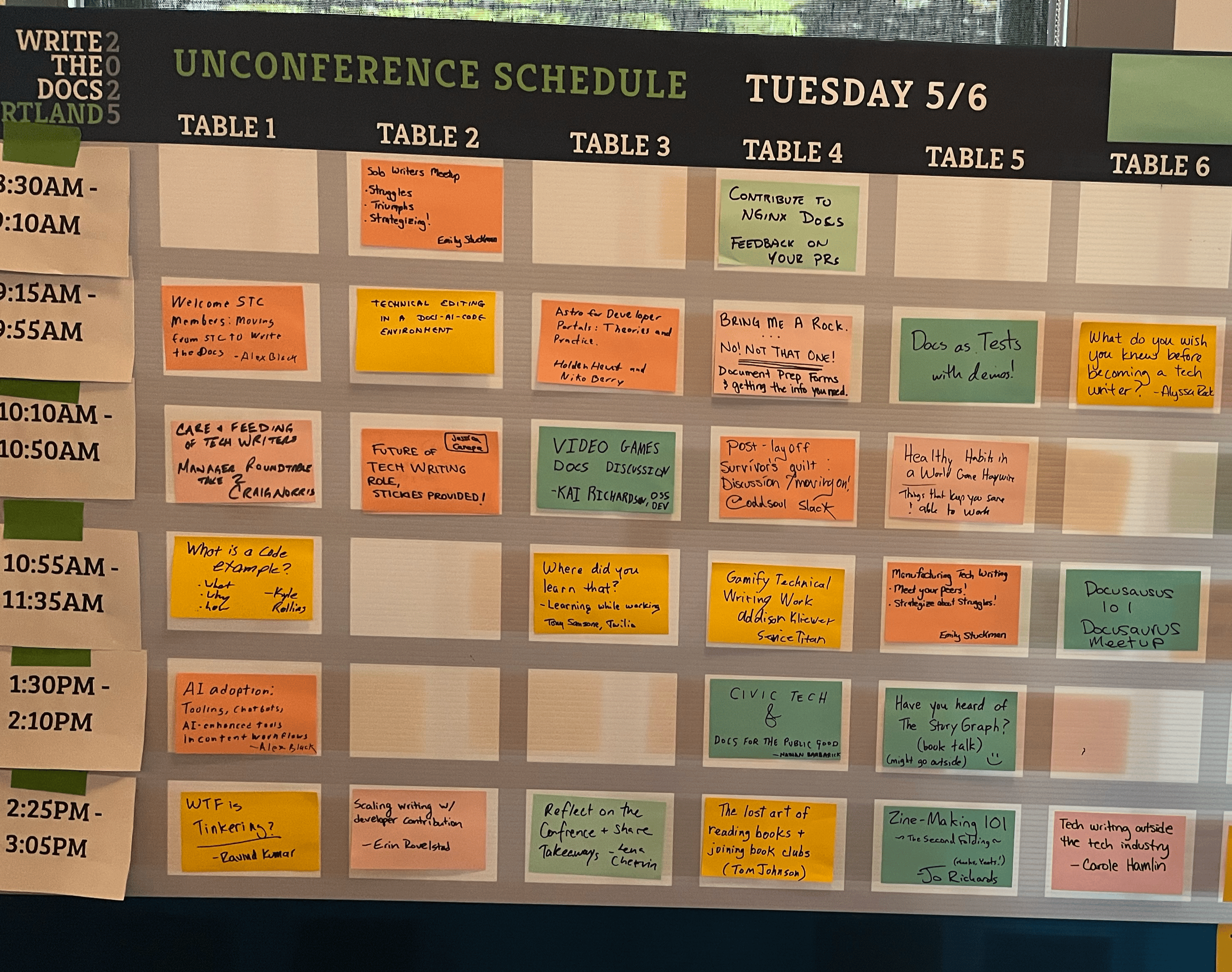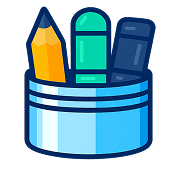The future of the technical writing role
My favorite part of the Write the Docs conference is the unconference. I love all the synergy of people and their excitement about swapping ideas. 💫
Often the people there are the only ones thinking deeply about certain problems in their organizations. Unconferences also remind me that people in the trenches can share different job titles and roles but still care about the same goals.

What is an unconference?
Think of a typical conference, but without a centralized, predetermined agenda. Any conference participant can propose a topic and lead a session on it. These sessions can be mini-presentations with open question time, but most often they are open discussions.
Unconferences offer lots of unique benefits, including the following:
- Pulse: The topics proposed give a unique pulse of what people who spend time in the trenches care about.
- Pragmatic talk: People can get very deep in the practical problem-solving trenches. Also, I’ve found that deeper follow-up conversations are more common at unconferences.
- Common ground found across roles: People in all sorts of roles at different organizations and industries find common ground in shared problem-solving. Sometimes conference talks can be inherently limited by a single person’s perspective and context. In contrast, a round table discussion lends itself to people from different contexts sharing their perspectives on the same idea or solution.
Given all the swirling change in tech right now, I hope more people across roles will turn to unconferences to get on-the-ground insights, perspectives, and practical problem-solving. If you want practical how-tos on running an unconference, check out the CityCamp guide on how to run an unconference.
I’ve been to many of these conferences, but this one stood out for these reasons:
- Write The Docs reported the most in-person attendance ever!
- AI was a frequent topic, ranging from impact on the environment to practical applications.
- With the closing of the Society for Technical Communication, there seemed to be more people who work in industries outside of tech. This made for some interesting conversations during the unconference.
Unconference takeaways on the future of the technical writing role
For this year’s unconference, I loosely facilitated a discussion on the future of the technical writing role. At some point, someone mentioned that we were talking from a software documentation perspective, which admittedly was true. It was a good reminder that technical writing and technical communication go beyond software documentation and the tech industry.
This is one of the main benefits of unconferences that bring together people with different titles and from various industries and companies—we can notice more how much the context of our work impacts how we approach and think about our craft.
The discussion made me think about how two people doing the same work can have such different job titles already. Is the difference just about how they do the work? How it’s perceived? How the organization values the results of their work?
While I could share a full list of job titles people brought up, I think it’s even more interesting to note some of the trends in what people shared and in some of the follow-up conversation from the unconference session.
- “Writer” is analogous to “Coder” and doesn’t capture the full scope, value, or complexity of the “technical writing” role.
- Prompting & using AI strategically is a skill that can uniquely map to the skills of a technical writer, especially one who has some understanding of coding and automation.
- Technical writers have always had the challenge of communicating the value of their role and work and measuring its impact.
- The work of a technical writer can have even broader impact across the organization as working with AI tools and agents becomes more widespread.
- Someone doesn’t need to have the job title “Technical Writer” to care deeply about how language can be used to help people, save lives, communicate, translate, and build clarity.
After our discussion wrapped up, I genuinely felt both hopeful and like “Technical Writer” as a job role has a translation problem.
Proposing job titles for the future
🤖🚫 Note: This is human-authored content with a real human voice and no official style guide.
Here’s a list of job titles I’ve since thought about. I’m sure if you asked me again in a few months, I might have different thoughts too.
It is interesting to notice people in various tech roles laud the amazingness of giving documentation to AI tools and agents and how these terms are emerging:
- Context Engineer
- Prompt engineer
- AI engineer
Product knowledge
Maybe the new word to index on will be “Product knowledge” to emphasize the source material that is curated, structured, optimized for usability, and accuracy-checked.
- Product knowledge Developer
- Product knowledge Engineer
- Product knowledge Strategist
- Product knowledge Architect
- Product knowledge Systems Engineer
Context
Maybe the new word for “Content Strategist” will revolve around “Context” to include the different ways that AI agents rely on metadata, structure, and other less visible aspects of your product experience that aren’t always thought about as “Content.”
- Context Developer
- Context Strategist
- Context Architect
- Context Design Engineer (!)
Information
Maybe the new word to index on will be “Information”, which has admittedly been around already.
- Information Developer
- Information Strategist
- Information Designer
- Chief Information Trust Officer (!)
- Information Architect (ok, this already has a certain meaning and role, will it be expanded?)
Polyglot future
Some of the best people I’ve ever worked with in tech shared this one thing in common—they had worked in different tech roles and brought a richer perspective and set of skills to their work.
- The designer who codes.
- The product manager who writes and codes.
- The developer who writes.
- The developer who designs.
I encourage writers to learn the basics of coding so that they might be added to this list as the writer who codes and so that they can better evaluate automated workflows and processes in their translation craft.
And you?
What do you think? Feel free to share in the comments.
Till next time. ✌🏽
Loading comments...

Comments
Join the conversation on Bluesky